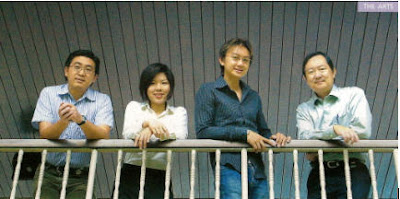Music Maxout September 2005

Singapore's Musical Theater
Musical theater in Singapore is 17 years old. The first musicals by Singaporeans, Makan Place and Beauty World, were written in 1988, which is surprisingly recent. Although there have been productions in Singapore way before that, they have been imported musicals. Since 1988, there has been a trickle of new musicals, averaging about 3 per year. Generally the styles of the musicals imitated the more melodic Broadway and West End composers, rather than the lyric-intelligent style of Stephen Sondheim.
Perhaps the most prominent composer of Singapore musicals is singer-songwriter Dick Lee. His portfolio includes Beauty World (1988), Sing to the Dawn (1996), A Twist of Fate (1997), and Forbidden City (2004). Currently the longest-running and most traveled musical is Chang and Eng (1997), with music composed by Ken Low. Since its premiere in Singapore, this musical has been to Malaysia, Thailand, and China. Ken Lyen has been one of the most prolific composers for musical theatre in Singapore, and has written such musicals as Big Bang! (1995), Yum Sing! (1999), Temptations (2000), and Sayang (2001). As for bookwriters, among the more prominent are Ming Wong who wrote Chang and Eng, and Michael Chiang who wrote Beauty World and Mortal Sins. Dick Lee and Ken Low write their own lyrics. The more well established choreographers include Najip Ali who choreographed Beauty World and Mortal Sins, and Gani Abdul Karim choreographed Sing to the Dawn and Song of the Whale.

Collaborative Art
Musical theater is one of the most difficult art forms. Unlike movies where the director might be the most powerful person in the team, musical theater is truly a collaboration among equals. The creators, director, choreographer, performers, designers, technical staff, stage manager, and others, all play important roles in creating a musical. If all these elements work, you may have a little masterpiece. Failure in any one area may drag the musical down.
Because the team is so large, the production cost starts off at a high level. Add to that the cost of theater rental, the cost of sets, sound and lighting, and the total expenditure can be awesome.
The main source of income for a musical comes from ticket sales. Failure to achieve substantial sales will result in a negative bottom line. Unfortunately most musicals lose money. Were it not from sponsors, theater companies cannot survive this loss. Therefore investment in musicals is a high-risk venture. This has resulted in very few new musicals being performed.
Five Foot Broadway
To redress the problem of the paucity of new musicals being staged in Singapore, I came up with the idea of incubating new musicals. Called Five Foot Broadway, this became a collaboration between the Musical Theatre Society, UAN, and The Next Stage. The aim was to ignite the creation of new musicals and to nurture them until they could be presented to the public. We matched writers with composers to write a musical. Then we added a director to each team. Singers and actors were auditioned, and gradually the teams grew until they reached their full complement. To keep production costs low, no-frills performances were given. This meant no sets, no costumes, and minimal props. It was back to basics, where the music, story, singing and acting were paramount.
The Shows
We started off incubating seven musicals, and five managed to meet our deadlines for completion. They were of quite different genres. Heartstrings, written by Jack Tan with music by Sean Wong, is a heartwarming story about a elderly violinist and his young protégé. Don’t Say I Do is a story of a wedding planner who is asked to plan the wedding for her ex, with music and words by Justin Kan. Dragon Tales is a retelling of the Chinese zodiac race by Ng Swee San and Bang Wenfu. Boom Baby Boom is a satirical farce about an unorthodox way of solving Singapore’s baby shortage. Lost In Transit is an emotional drama about a kampong girl experiencing the tribulations of big city life.
Results
The shows were presented as part of the Singapore Festival of Arts fringe 2005, and was an astounding success. All the shows were sold out, and 150 people were on the waiting list. Critical response was generally very favorable. A CD recording of selected songs was produced. Two shows were selected by other theater groups for further development and staged performances.
Discovering New Talents
One of the major achievements of Five Foot Broadway is the discovery of new talents. We uncovered new writing and composing talents, new directors, new producers, new designers for our website and program brochure, and of course, new performers.
How Did We Succeed?
The secret of success of Five Foot Broadway is the teamwork. We were able to achieve the right balance of writers, composers, directors, and performers, so that the interactions became synergistic and culminated in a powerful creative force. The more experienced members of our team mentored the newcomers. Musical theater was being created and forged in real time, with creative inputs from not only the writers and composers, but also the directors and actors. The musicals were presented to each other, and helpful comments were made. This gave a sense that the musicals belong to everyone.
Where Do We Go From Here?
Five Foot Broadway has been highly successful in generating new musicals. The response by creative team, the performers, and the audience have all been tremendously enthusiastic. We believe it will be of fundamental importance in stimulating more and higher quality works, culminating in a flowering of musical theater in Singapore. We intend to make it an annual event. Our vision is that one day our musicals will make it to Broadway!
Website: http://www.musicals.org.sg/







